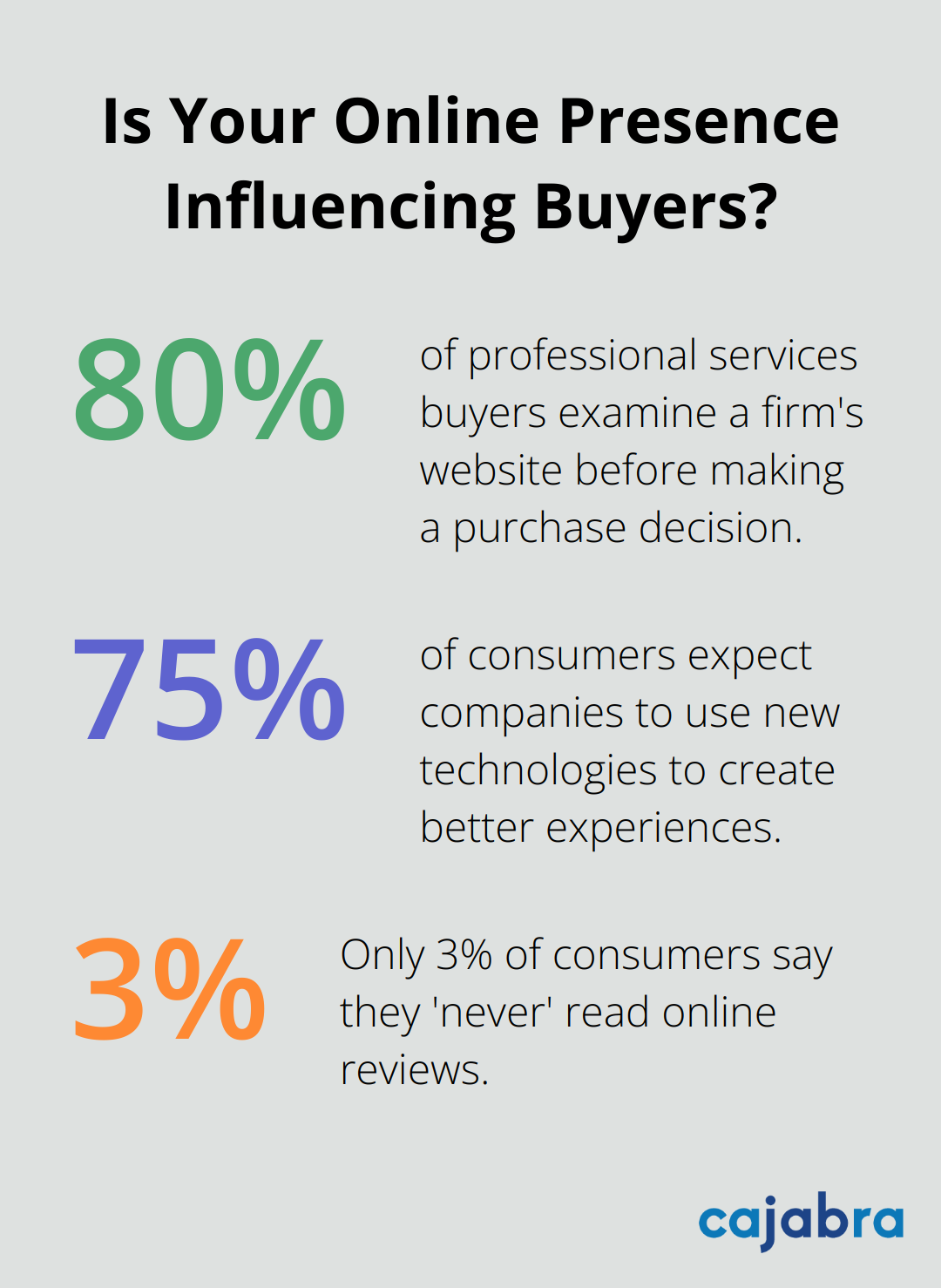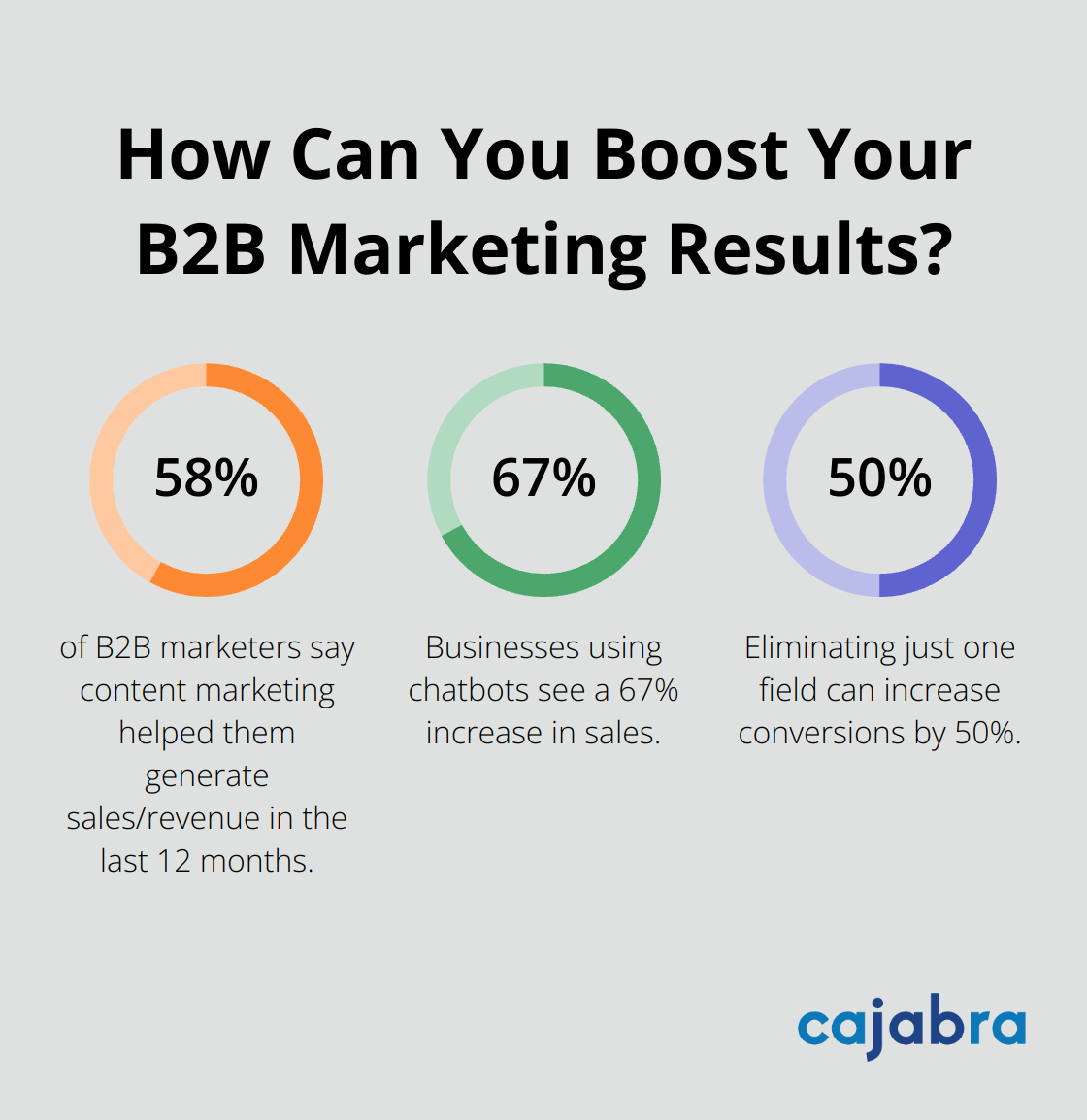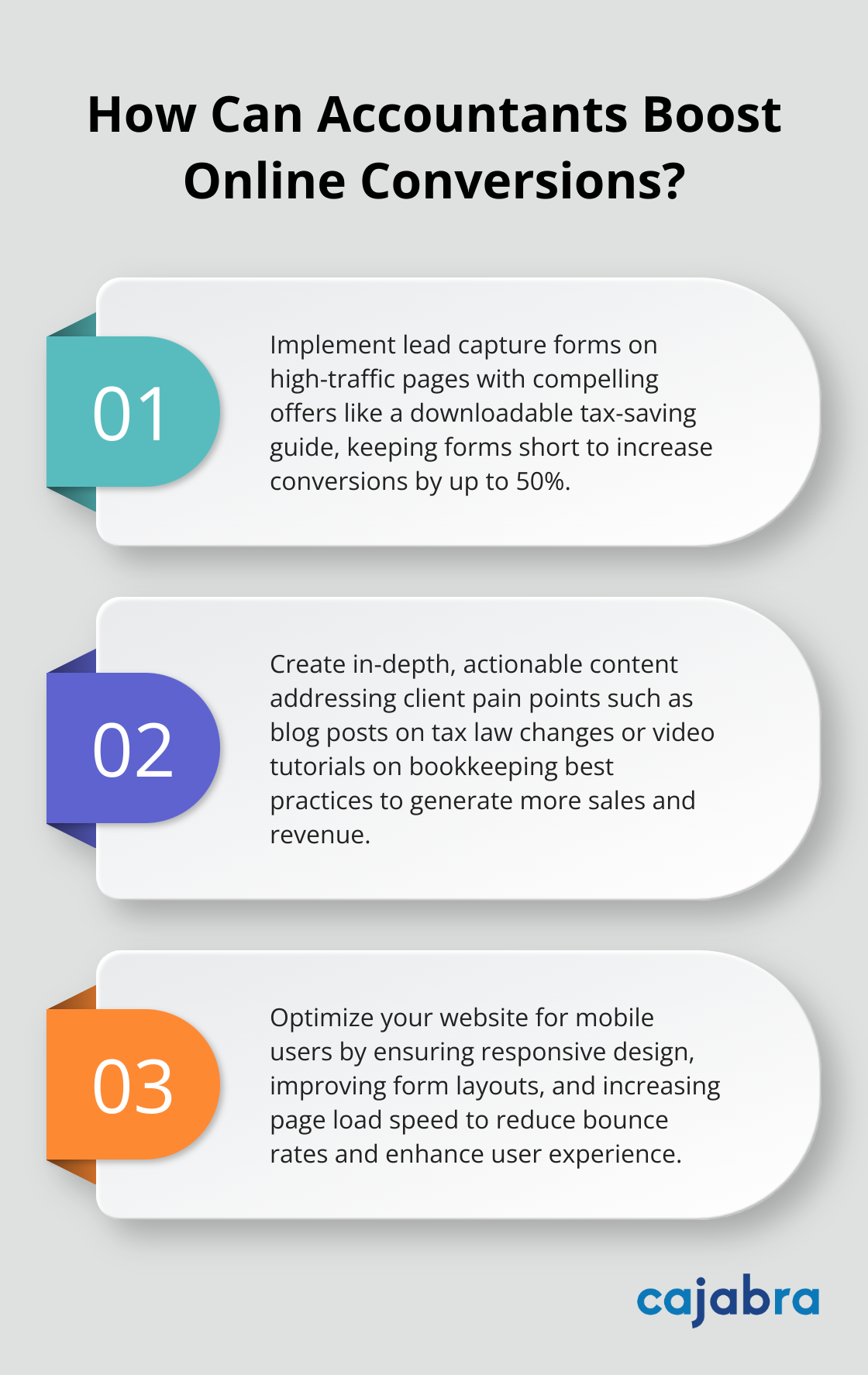
In today's digital landscape, accounting firms need more than just expertise; they need a powerful online presence. At Cajabra, LLC, we've seen firsthand how accounting consulting websites can make or break a firm's success.
A well-designed website isn't just a digital brochure; it's a client-converting powerhouse. This post will guide you through the essential elements of creating an accounting website that not only attracts visitors but turns them into loyal clients.
In the digital age, your accounting firm's website serves as your virtual storefront. It often provides the first impression to potential clients, making it a critical asset for growth and success in the competitive accounting industry.
A well-designed website acts as a tireless salesperson for your accounting firm. A study by Hinge Marketing reveals that 80% of professional services buyers examine a firm's website before making a purchase decision. This statistic highlights the website's pivotal role in attracting new clients.

Your website also proves invaluable for client retention. It provides easy access to resources, client portals, and up-to-date information, which enhances client satisfaction and loyalty. A Salesforce survey found that 75% of consumers expect companies to use new technologies to create better experiences (a clear indication of the importance of a modern, user-friendly website).
In the accounting world, trust reigns supreme. Your website offers a powerful platform to build that trust. You can establish credibility even before a potential client reaches out by showcasing your expertise through thought leadership content, client testimonials, and case studies.
A recent study found that only 3% of consumers say they 'never' read online reviews, reflecting how ingrained reviews are in most consumers' business research. For accounting firms, this translates to featuring client testimonials prominently on your website, which can significantly impact your perceived trustworthiness.
With thousands of accounting firms competing for attention online, a generic website falls short. Your website must clearly communicate your unique value proposition and set your firm apart from competitors.
One effective strategy to stand out involves highlighting specialized services or niche expertise. For example, if your firm excels in tax planning for small businesses, your website should emphasize this focus throughout its content and design.
A high-converting website evolves based on user behavior and performance data. Tools like Google Analytics provide valuable insights into how visitors interact with your site, allowing you to make data-driven improvements.
For instance, a high bounce rate on your services page might indicate that the content lacks engagement or the layout confuses visitors. Continuous analysis and optimization of your website can improve its performance and, ultimately, your conversion rates.
As we move forward, we'll explore the key elements that transform a good accounting website into a great one. These components work together to create a powerful online presence that not only attracts visitors but converts them into loyal clients.
At the heart of every successful accounting firm's online presence lies a website that not only attracts visitors but also converts them into loyal clients. This chapter explores the key elements that transform a standard website into a powerful client-generating tool.
Your website's homepage must answer the question, "Why should potential clients choose your accounting firm?" A clear, concise, and compelling value proposition sets the tone for your entire online presence. Instead of generic statements, opt for specific, benefit-oriented messages. For example: "We help small businesses reduce tax liability by an average of 15%."
A Stanford University study found that 75% of users judge a company's credibility based on their website's design. Your site should captivate visitors visually and offer intuitive navigation. Implement a clean, professional design with a color scheme that aligns with your brand. Create a logical and easy-to-use menu structure. Users who can't find what they need within seconds will likely leave your site.
Potential clients seek assurance that they're in capable hands. Your website should demonstrate your expertise through high-quality content. Consider including:
Blog posts about recent tax law changes
Downloadable guides on financial planning
Video tutorials on using accounting software

Companies that blog receive 97% more links to their website (according to HubSpot), which significantly boosts online visibility and perceived authority.
77% of consumers 'always' or 'regularly' read online reviews when browsing for local businesses. Your website should feature:
Client testimonials
Case studies
Relevant awards or certifications
These elements build trust and illustrate the real-world impact of your services. For instance, you could highlight a case study showing how you helped a local business save $50,000 in taxes through strategic planning.
Every page on your website should serve a clear purpose and guide visitors towards taking action. Use prominent, strategically placed calls-to-action (CTAs) throughout your site. These could be buttons or links inviting visitors to:
"Schedule a Free Consultation"
"Download Our Tax Savings Guide"
"Get a Quote"
Ensure these CTAs stand out visually and use action-oriented language.
The elements discussed in this chapter form the foundation of a high-converting accounting website. However, creating a website is just the first step. The next chapter will explore how to optimize your site for maximum conversions, turning visitors into valuable clients.
Implement lead capture forms strategically throughout your website. These forms should offer something of value in exchange for contact information. Create a downloadable guide on "10 Tax-Saving Strategies for Small Businesses" or a free tax planning checklist. Place these offers on high-traffic pages and use compelling headlines to grab attention.
Research shows that eliminating just one field can increase conversions by a whopping 50%. Keep your forms short, ask only for essential information like name and email address. This approach will significantly increase your lead generation efforts.
Create valuable content that addresses your target audience's pain points. This could include blog posts on recent tax law changes, video tutorials on bookkeeping best practices, or infographics explaining complex financial concepts.

According to the Content Marketing Institute, 58% of B2B marketers say content marketing helped them generate sales/revenue in the last 12 months, up from 42% the previous year. Focus on creating in-depth, actionable content that showcases your expertise and provides real value to potential clients.
Implement chatbots on your website to provide instant responses to visitor inquiries. These AI-powered tools can answer common questions, schedule consultations, and even qualify leads 24/7. A study by Drift found that businesses using chatbots see a 67% increase in sales.
Program your chatbot with accurate information about your services, pricing, and availability. This immediate engagement can significantly improve user experience and increase the likelihood of conversion.
With over 50% of global web traffic coming from mobile devices (according to Statista), mobile optimization is no longer optional. Ensure your website is responsive and provides a seamless experience across all devices.
Pay special attention to mobile form design, button sizes, and page load times. Google's Mobile-Friendly Test tool can help identify areas for improvement in your mobile site design.
Website speed directly impacts user experience and conversions. According to Google, as page load time increases from 1 to 3 seconds, the probability of bounce increases by 32%. Optimize your site's speed by:
Tools like Google's PageSpeed Insights can provide specific recommendations for improving your site's load time.
Creating a high-converting website for your accounting firm requires ongoing refinement and optimization. We explored essential elements that make accounting consulting websites effective client-conversion tools. These components attract and retain clients through clear value propositions, user-friendly designs, compelling content, and strategic CTAs.

Your website reflects your expertise and builds trust as the digital face of your accounting firm. It guides potential clients to take action through lead capture forms, valuable content, chatbots, mobile optimization, and improved page load speeds. The digital landscape evolves constantly, necessitating regular testing, analysis, and improvements based on user behavior and industry trends.
At Cajabra, we help accounting firms create and optimize websites that convert visitors into loyal clients. Our JAB System™ moves accountants from overlooked to overbooked in 90 days. We offer comprehensive solutions, including website modernization and digital footprint optimization. Partner with Cajabra to focus on your expertise while we handle your online presence and marketing efforts.



